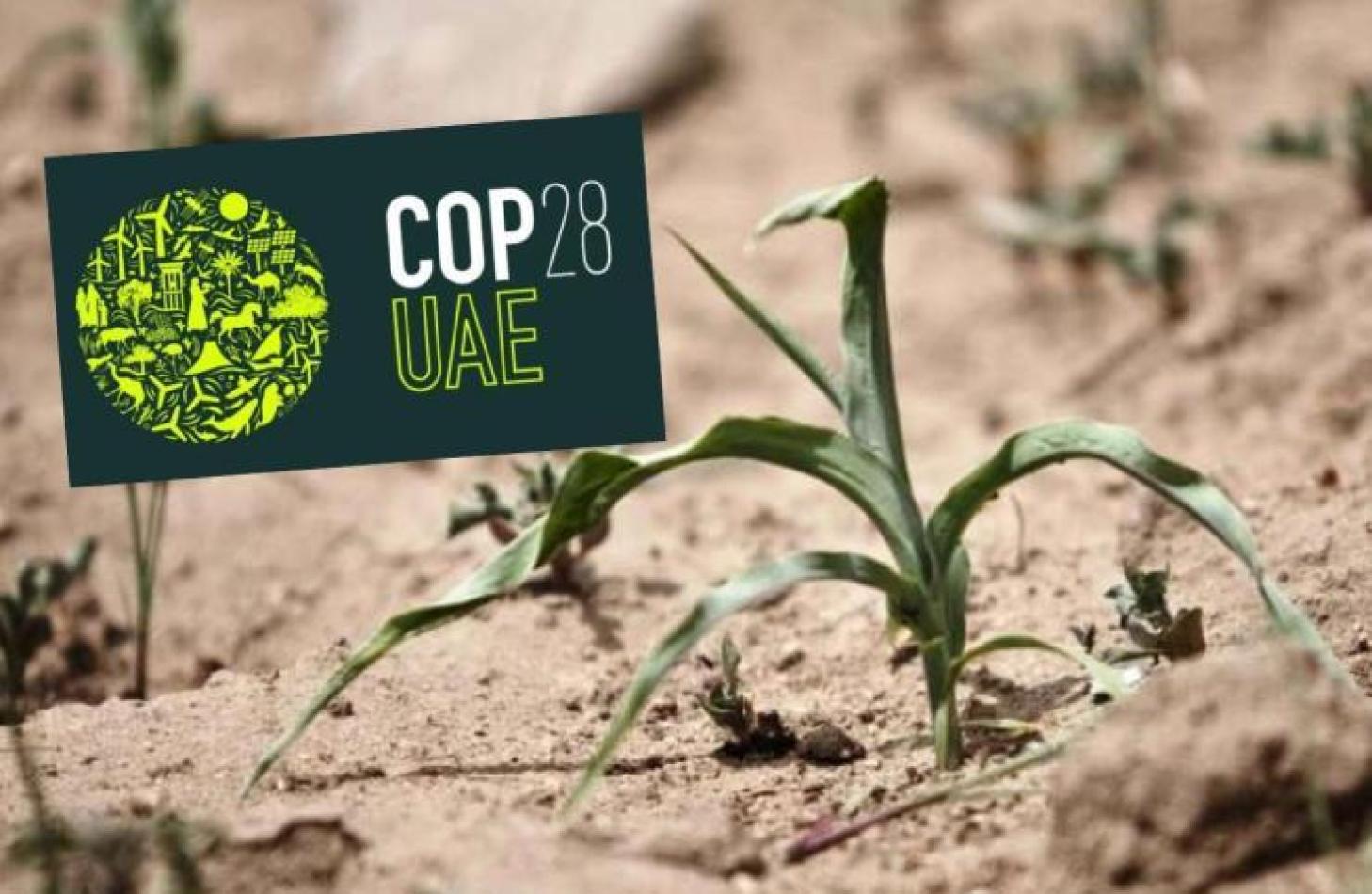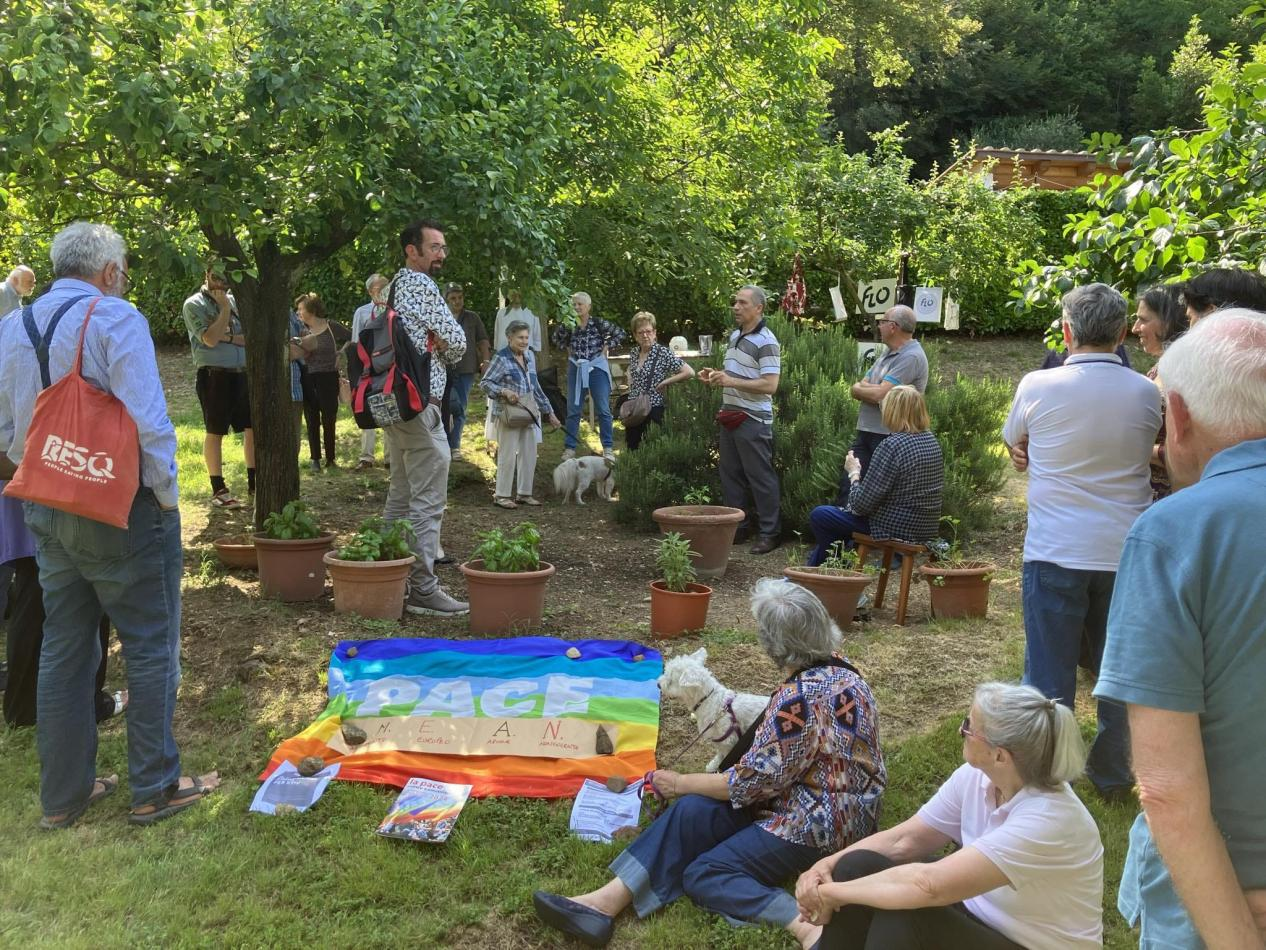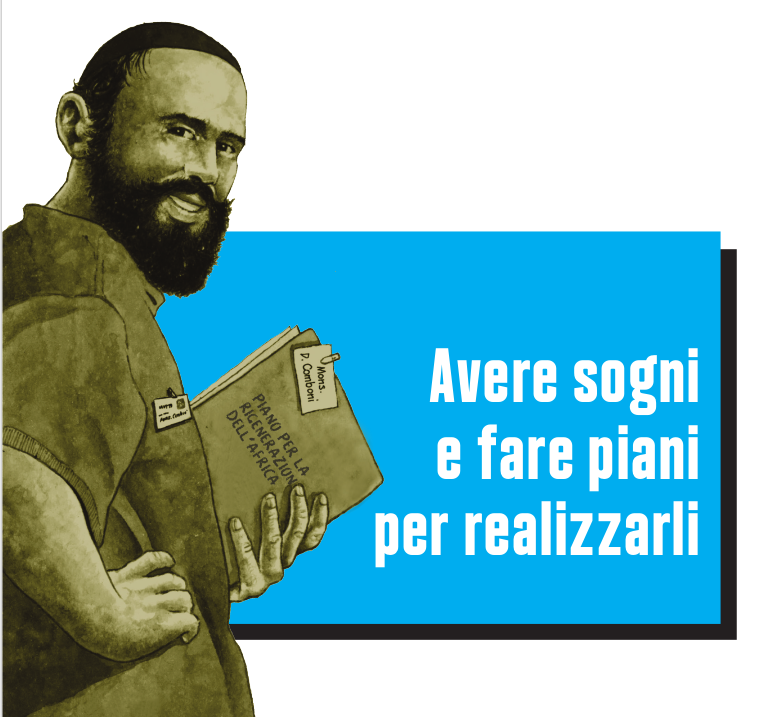[Photo: © FAO/Giulio Napolitano]
by Bro. Alberto Parise MCCJ
The “UAE Consensus”, the agreement arrived at by the 197 Parties to the Paris Agreement on climate action, has been hailed as a historical achievement that marks the beginning of the end of fossil fuels. In fact, for the first time in 30 years, countries agreed to transition «away from fossil fuels in energy systems, in a just, orderly and equitable manner, accelerating action in this critical decade, so as to achieve net zero by 2050 in keeping with the science».
Despite strong opposition from OPEC countries, this crucial point eventually emerged to keep alive the hope that global warming could be kept within 1.5°C above pre-industrial levels, a threshold considered critical to containing the impacts of climate change. Indeed, both UNEP’s 2023 Production Gap Report 20231 and the IPCC’s 2023 Climate Change Report2 found that 86% of greenhouse gas emissions come from the burning of hydrocarbons. And since a transition also requires the implementation of an energy alternative, the motion to triple renewable energy and double energy efficiency by 2030 is quite crucial as well.
There is widespread awareness that we remain far away from what is needed to achieve this goal: both in terms of the commitments made by the signatory countries of the Paris Agreement, which are nowhere near keeping global warming within 1.5°C; and in terms of the actual implementation of these commitments, which fall far short of promises. And within the UAE Consensus, there are also several loopholes3 that leave the way open for uncontrolled global warming.
However, COP28 reminds us of some important things. Firstly, that nothing should ever be taken for granted. There was much scepticism on the eve of the conference, due to the fact that the president-designate, Sultan Al Jaber, is the CEO of the Abu Dhabi National Oil Company (ADNOC), one of the largest in the world. And instead, the presidency has shown to act in good faith and tried to bring all countries together for a real breakthrough in climate commitment. Trying to include everyone and keeping its eyes fixed on the 1.5°C global warming limit. To achieve this, the presidency has sought to build an ambience of mutual trust, and it is in this key that the decision should be read, which came on the first day of COP28, to make operational and to finance the climate change loss and damage fund, another historic achievement. Likewise, the second day there was the announcement of the Charter for the Decarbonisation of the Oil and Gas Industry, signed by 52 international and national companies4, which hold 40% of crude oil production.
This, too, was a sign to help have more open and constructive attitudes in the negotiations. It is therefore raher puzzling the scoop-hunting of the Western press who, just when the conference had started well, used a decontextualised and cut recording of a conversation between Al Jaber and Mary Robinson, prior to the conference, which gave a perception of the COP28 president opposite to what he was publicly doing in the conference.
Secondly, it should be noted that for the first time a political decision has been influenced by science, which tells us what we need to do to stay within 1.5°C of global warming. The role of politics is to agree on how to do it. There are, of course, conflicting interests and different priorities among the signatory countries of the Paris Agreement, but it is possible that reason will help us reconcile positions, starting from reality, from what is happening to our common home, from the proven causes of it all and the remedies that are clearly needed. This is also thanks to the moral pressure and alternative vision of indigenous peoples, youth, civil society and religions, who powerfully articulate an alternative vision of the planet, the economy, climate justice and a fair transition that leaves no one behind. Science and spirituality together are pushing the political class in a direction opposite to the trajectory that the world is unfortunately following.
This historic moment is crucial: it is the last opportunity to accelerate action to stabilise the climate. At the current rate of emissions5, in seven years we will have emitted enough climate-changing gases into the atmosphere to exceed the 1.5°C threshold. Faced with such a scenario, COP28 was the first test of the Paris Agreement, measuring achievements from 2015 to date and initiating an acceleration process to reach the Agreement’s goals on time. It is now up to States to revise their national climate plans, within two years, to align them with these goals. It is up to civil society as a whole to pressure national governments to have the courage to do what needs to be done. As Antonio Guterres, Secretary General of the United Nations, pointed out, «Whether you like it or not, abandoning fossil fuels is inevitable. Let us hope it will not come too late».
Thirdly, the conference made it visible that an energy transition is not possible without a broader economic transition. The case of Colombia is emblematic. Its economy depends on the export of coal and oil (between 40% and 50% of exports), producing 9% of the taxes collected by the State. In spite of this, President Petro, elected with a programme to «give the country a green and not a black future»6, has initiated an industrial reconversion, focusing on renewable energies and a just transition that does not leave unemployed the more than 100,000 workers in the fossil fuel sector. But this has made the markets nervous – said Susana Muhamad, Minister of the Environment and Sustainable Development – and so instead of finding support and incentives for the green transition, the country «is being punished by the financial economic system: access to financing has become more expensive, the country is threatened with downgrading in the international credit system and is being strangled with debt». On the other hand, the entry of Lula’s Brazil, which presents itself as a champion of climate action, into OPEC has caused a stir, at the very moment when it is being said that hydrocarbons must be abandoned7.
That contradiction mirrors the situation in which most developing countries find themselves: in order to cope with the debt crisis and to finance adaptation to climate change, they have to exploit their energy and mineral resources. It is clear that there can be no solution to the climate crisis without a change in the economic and financial system and without aligning the markets with the reality of the crisis and the green transition.
Finally, COP28 raised the profile of religions in the fight against climate change even higher. Prior to the Dubai conference, the World Summit of Religious Leaders8 took place in Abu Dhabi, signing a declaration of support for combating climate change. More than 200 participants – religious leaders representing the world’s major religions, academics, climate scientists, youth activists and representatives of indigenous peoples – emphasised the ethical duty of religious communities and political leaders to address the climate crisis with full responsibility. In addition, a Faith Pavilion featured in Dubai for the first time in a COP to raise awareness, inspire, work together and promote climate action that reflects God’s plan for Creation.
On the Catholic side, we have witnessed a great acceleration in recent years, imparted by Pope Francis. In 2020, he announces the special anniversary year of Laudato si’, to relaunch it in view of the urgency of the climate crisis and the utterly disappointing response. In 2021, the Dicastery for the Promotion of Integral Human Development launches the Laudato Si’ Action Platform, to involve the entire Catholic world in path of ecological conversion. On 4th October 2022, the Holy See signs the Paris Agreement, becoming one of the 197 Parties to the climate negotiations. On 4th October 2023, came the publication of the Apostolic Exhortation Laudate Deum, which focuses on climate change and aims to accelerate the ecological transition. And immediately afterwards, Pope Francis plans to personally attend COP28 and the inauguration of the Faith Pavilion. Unfortunately, his health condition would not allow him to do so, but his message has been read by the Secretary of State, Card. Parolin: the way out of this «is the one that you are pursuing in these days: the way of togetherness, multilateralism. It is essential to build trust and this applies to the care of creation as well as to peace. These are the most urgent issues and they are linked. (…) It is disturbing that global warming has been accompanied by a general cooling of multilateralism, a growing lack of trust within the international community, and a loss of the “shared awareness of being… a family of nations”. It is essential to rebuild trust, which is the foundation of multilateralism.
It is up to this generation to heed the cry of peoples, the young and children, and to lay the foundations of a new multilateralism. Why not begin precisely from our common home? Climate change signals the need for political change. Let us emerge from the narrowness of self-interest and nationalism; these are approaches belonging to the past. Let us join in embracing an alternative vision: this will help to bring about an ecological conversion, for “there are no lasting changes without cultural changes” (Laudate Deum, 70). In this regard, I would assure you of the commitment and support of the Catholic Church, which is deeply engaged in the work of education and of encouraging participation by all, as well as in promoting sound lifestyles, since all are responsible and the contribution of each is fundamental.»
In conclusion, the message Pope Francis directed to politicians (LD 60), can also be paraphrased for Christian communities, pastoral agents, missionaries: why do we want to continue today with an evangelisation that will be remembered for its inability to bring about ecological conversion when it was urgent and necessary to do so?
1The Production Gap Report – launched for the first time in 2019 – traces the discrepancy between fossil fuel production predicted by governments and global production levels, consistent with limiting warming to 1.5°C or 2°C.
2This is the 6th Assessment Report of the Intergovernmental Panel on Climate Change, a selected group of scientists that review and analyse the scientific research results on climate change.
3To name but a few: the definition of transition fuels; the lack of an economic structure necessary for the transition, which cannot simply be energetic, but also economic; the inequalities between the current economic systems that risk pushing developing countries to continue to exploit fossil fuels; the lack of a clear commitment to reduce fossil fuel extraction (indeed, there are major expansion plans in place: every new investment in oil and gas will mean continued extraction for 30 years); the illusion of carbon capture and storage. But above all, the fact that there is nothing binding; there is a lack of efficient, mandatory and easily monitored energy transition provisions.
4Of these, 19 have adopted a target of zero emissions in 2050 for the first time, while 31 have also committed to achieving zero methane emissions by 2030.
5In the last year, the increase of CO2 equivalent in the atmosphere was about 40 Gt; the remaining ‘budget’ of CO2 equivalent before reaching 1.5°C warming is estimated at 275 Gt. Unfortunately, the UAE Consensus does not incorporate the scientific recommendations for a 43% cut in emissions from 2019 levels by 2030 and 60% by 2035.
6https://www.bbc.com/future/article/20221116-how-colombia-plans-to-keep-its-oil-and-gas-in-the-ground.
7At the end of COP28, the auction for the concession of 603 new oil and gas extractions, on land and sea in Brazilian territory, has begun.
8The summit was organised by the Muslim Council of Elders in cooperation with the COP28 Presidency and UNEP.





